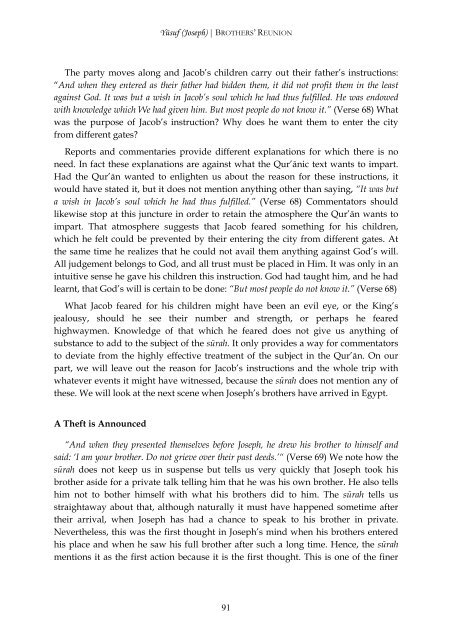Volume 10 Surah 12 - 15 - Enjoy Islam
Volume 10 Surah 12 - 15 - Enjoy Islam
Volume 10 Surah 12 - 15 - Enjoy Islam
Create successful ePaper yourself
Turn your PDF publications into a flip-book with our unique Google optimized e-Paper software.
Yūsuf (Joseph) | BROTHERS’ REUNION<br />
The party moves along and Jacob’s children carry out their father’s instructions:<br />
“And when they entered as their father had bidden them, it did not profit them in the least<br />
against God. It was but a wish in Jacob’s soul which he had thus fulfilled. He was endowed<br />
with knowledge which We had given him. But most people do not know it.” (Verse 68) What<br />
was the purpose of Jacob’s instruction? Why does he want them to enter the city<br />
from different gates?<br />
Reports and commentaries provide different explanations for which there is no<br />
need. In fact these explanations are against what the Qur’ānic text wants to impart.<br />
Had the Qur’ān wanted to enlighten us about the reason for these instructions, it<br />
would have stated it, but it does not mention anything other than saying, “It was but<br />
a wish in Jacob’s soul which he had thus fulfilled.” (Verse 68) Commentators should<br />
likewise stop at this juncture in order to retain the atmosphere the Qur’ān wants to<br />
impart. That atmosphere suggests that Jacob feared something for his children,<br />
which he felt could be prevented by their entering the city from different gates. At<br />
the same time he realizes that he could not avail them anything against God’s will.<br />
All judgement belongs to God, and all trust must be placed in Him. It was only in an<br />
intuitive sense he gave his children this instruction. God had taught him, and he had<br />
learnt, that God’s will is certain to be done: “But most people do not know it.” (Verse 68)<br />
What Jacob feared for his children might have been an evil eye, or the King’s<br />
jealousy, should he see their number and strength, or perhaps he feared<br />
highwaymen. Knowledge of that which he feared does not give us anything of<br />
substance to add to the subject of the sūrah. It only provides a way for commentators<br />
to deviate from the highly effective treatment of the subject in the Qur’ān. On our<br />
part, we will leave out the reason for Jacob’s instructions and the whole trip with<br />
whatever events it might have witnessed, because the sūrah does not mention any of<br />
these. We will look at the next scene when Joseph’s brothers have arrived in Egypt.<br />
A Theft is Announced<br />
“And when they presented themselves before Joseph, he drew his brother to himself and<br />
said: ‘I am your brother. Do not grieve over their past deeds.’“ (Verse 69) We note how the<br />
sūrah does not keep us in suspense but tells us very quickly that Joseph took his<br />
brother aside for a private talk telling him that he was his own brother. He also tells<br />
him not to bother himself with what his brothers did to him. The sūrah tells us<br />
straightaway about that, although naturally it must have happened sometime after<br />
their arrival, when Joseph has had a chance to speak to his brother in private.<br />
Nevertheless, this was the first thought in Joseph’s mind when his brothers entered<br />
his place and when he saw his full brother after such a long time. Hence, the sūrah<br />
mentions it as the first action because it is the first thought. This is one of the finer<br />
91

















